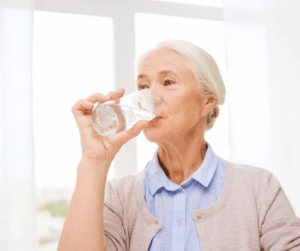
Staying well-hydrated is usually attributed to general health improvements, but the effects on our cognition and brain health is often overlooked. It’s common knowledge that around 60% of our bodies are made up of water; all of our body’s cells depend on water to effectively carry out essential functions, and this includes the cells in our brain.
Some of the main causes of dehydration are difficulty in habituating regular fluid intake, and a dislike for drinking plain water. Our bodies do hydrate via a range of fluids, but, of course, plain water is best. Some people turn to infused water options to improve their hydration routines, but more on that later.
What does dehydration do to the brain?
Research has found that when dehydrated, an adult’s brain shows increased neuronal activation while undertaking cognitive tasks, indicating that dehydration requires our brains to work harder than usual when completing cognitively challenging activities.
In younger, healthy adults, this extra effort tends to present through mood changes and general fatigue, while the elderly and others with a reduced cognitive reserve are more likely to show signs of reduced cognitive performance.
Furthermore, a meta-analysis covering 33 studies and over 400 participants found that dehydration was clearly associated with notable impairments in executive function, fine motor coordination, and attention capacity.
Are men and women equally affected by dehydration?
Regardless of age, sensitivity to the effects of poor hydration is generally higher in females, although the elderly are particularly vulnerable. Research examining 2,506 adults over the age of 60 found that inadequately hydrated females perform more poorly on cognitive tasks that are related to processing speed and attention. Dehydrated males also showed a decline in cognitive performance but to a lesser extent.
In younger women, the cognitive difficulties resulting from dehydration can be easily reversed by rehydrating, but in the elderly, the cellular stress caused by prolonged dehydration can lead to continued cognitive decline.
Hydration and Alzheimer’s
Research has found that dehydrated individuals represent a higher risk for dementia, but equally, those with dementia are also at a higher risk for dementia. Our brains have a ‘thirst sensor’ that signals to us that we need to replenish fluids. However, our brains are less sensitive to this signal as we age, resulting in elderly people becoming less aware of their hydration status. Furthermore, studies indicate that being dehydrated can accelerate a dementia patient’s cognitive decline.
With less water present at a cellular level, a buildup of toxic proteins can occur in the brain, resulting from an inefficient capability to effectively flush them out.
There is no doubt that dehydrated brain cells are associated with cognitive dysfunction; however, research continues, and as yet, there is no concrete evidence as to whether dehydration can directly cause dementia.
What is clearly understood is that the elderly are at greater risk of becoming dehydrated, and their brains are more vulnerable to the cognitive decline associated with dehydration.
As we age and our bodies gain fat and lose muscle, the amount of water that our bodies can store declines. Muscle tissue is made up of almost 80% water, while fat cells hold a significantly lower average of 10% water. Given that women generally have a lower muscle mass percentage than men, it stands to reason that they have an increased vulnerability to the effects of dehydration; the same is true for the elderly.
Another risk factor for increased dehydration side effects in older people is due to our kidney functions changing as we age. Our bodies become less able to conserve water through the concentration of urine, which also makes it harder to maintain a healthy regulation of sodium levels in our body.
Staying well-hydrated
To keep our brains adequately hydrated, researchers recommended that females consume between 8 to 11 cups per day, and males consume between 10 to 15 cups. These guidelines will vary depending on an individual’s level of activity, weight, the medications they use, and more.
Once you establish the amount of fluids you need to consume each day, it can help to use a mobile tracking app to log the amount you drink as you go – most apps will also give you the option of receiving reminder alerts throughout the day to help keep you on track. Adding water-dense foods will also help you to stay well-hydrated, or if you don’t like the taste of water, opt for fruit infused water or flavored sparkling water.
It is important to note that, while staying well-hydrated is vital for optimal health and cognition, too much fluid intake can cause impairments. Becoming over-hydrated can cause a drop in our body’s sodium levels, resulting in a range of neurological issues and even delirium.
The bottom line
For sufferers of Alzheimer’s, maintaining adequate hydration is crucial to maintaining optimal cognition and general feelings of wellbeing and preventing an unnecessarily accelerated rate of cognitive decline. Dementia patients tend to struggle for a variety of reasons, so ensuring that your or your loved one has a system in place for maintaining optimal fluid intake throughout the day is essential for getting the maximum benefits possible.